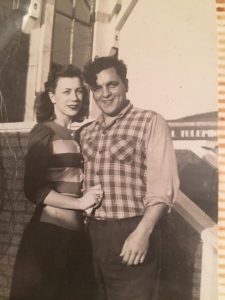By Laura Farah Gleneck, LEAD Center Project Director and National Disability Institute Employment Division Director
When I was born, the landmark Olmstead decision was still decades away. At that time, institutionalizing children who were “different” was the norm. However, I was fortunate to be raised by foster parents in the 1960s who were far ahead of their time in celebrating diversity. The Farah household, where I grew up, included a diverse range of children with varying levels of differences. The expectation was the same for all of us: to achieve our goals. Disability labels didn’t exist in our home. We were simply children, each responsible for determining what skills or accommodations we needed to succeed. And trust me, we all found our way.

Laura’s parents: Dorothy and Herbert Farah
Dorothy Farah, my foster mother, was the eldest of 13 children. Despite not finishing high school initially, she later earned her GED and enrolled in a community college. Her keen eyesight and insight allowed her to see us as individuals brimming with potential. When the Farahs took me in at nine months old, I was a fragile infant labeled “mentally retarded” and destined for a children’s mental institution. I had a club foot, complete facial paralysis, crossed eyes and very poor vision. The Farahs were told that, “I was nothing more than a blob, unable to sit upright, barely able to talk.” Dorothy, however, saw beyond my physical challenges. She saw a beautiful young girl full of possibilities. She fought tirelessly to keep me out of an institution and, before her passing when I was nine years old, she adopted me.
On June 20, as I virtually participated in “Celebrating the 25th Anniversary of Olmstead v. LC,” I reflected on my journey. Listening to the success stories of those who had been institutionalized, I began to understand the profound impact of Dorothy Farah’s work. She, like countless other parents and caregivers, knew there was a more humane and fulfilling life outside of institutions. Because of Dorothy Farah’s unwavering belief in my potential I, too, am a success story.
The Olmstead decision, which mandates that people with disabilities have the right to live in their community rather than institutions, has transformed countless lives. It highlights the importance of seeing individuals for their potential, just as Dorothy did for me. Her legacy, and the legacy of the Olmstead decision, continues to inspire and remind us that every individual deserves the chance to thrive in a supportive and inclusive community.
